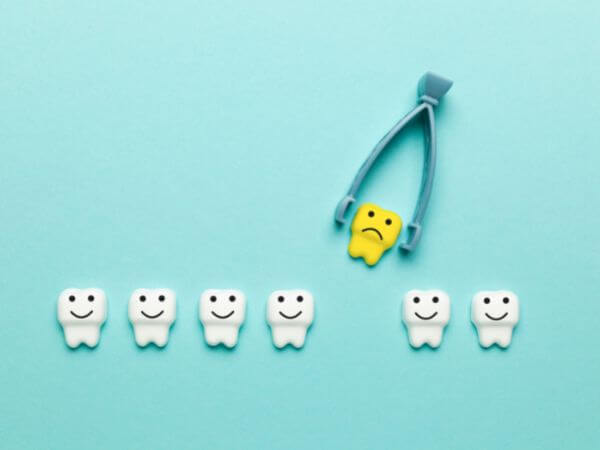Dental Extractions in Los Angeles
Dental extractions, also known as tooth extractions, involve removing a tooth from its socket in the jawbone. While it may sound unsettling, dental extractions are actually one of the most common dental procedures performed. They may be necessary for a variety of reasons, including damage, infection, crowding, or impacted teeth.
If you’re experiencing tooth pain, sensitivity, or other dental issues, it’s important to talk to your dentist. They can evaluate your situation and determine if a dental extraction is necessary.
At Los Angeles Oral Surgeons, our experienced team of dental professionals can provide you with expert care and guidance throughout the extraction process.
Contact us or call (323) 612-1201 today to schedule a consultation and take the first step towards a healthier, happier smile.
Why are dental extractions necessary?
There are several reasons why a dental extraction may be necessary. Some of the most common reasons include:
- Damage or decay: If a tooth is severely damaged or decayed, it may not be able to be saved with a filling, crown, or other dental procedure. In these cases, a dental extraction may be necessary to prevent further damage or infection.
- Infection or abscess: If a tooth becomes infected or develops an abscess, a dental extraction may be necessary to prevent the infection from spreading to other parts of the body.
- Crowding: If a tooth is causing crowding in the mouth, it may need to be extracted to make room for other teeth.
- Impacted teeth: If a tooth is impacted, meaning it is stuck beneath the gum line and cannot emerge, it may need to be extracted.

What happens throughout the extraction process?
Before a dental extraction, your dentist will perform a thorough examination of your mouth and take X-rays to determine the best approach for the extraction. They will also discuss the anesthesia options with you and answer any questions you may have about the procedure.
During the extraction, you will be given local anesthesia to numb the area around the tooth. You may feel some pressure or pulling during the extraction, but you should not feel any pain. If you are undergoing a surgical extraction, you may also be given sedation or general anesthesia to make you more comfortable.
After the extraction, your dentist will provide you with specific instructions for caring for the extraction site. You may be advised to rest for the remainder of the day and avoid strenuous activity. You may also be given pain medication and antibiotics to prevent infection. It is important to follow all post-extraction instructions carefully to ensure proper healing and prevent complications.

How long does recovery take?
The recovery time after a dental extraction varies based on the complexity of the case. Generally, most people are able to resume their routine activities within 48 to 72 hours, although it may take several weeks for the jawbone to fully heal.
If you are considering replacing the extracted tooth with a dental implant, it is important to allow for a few months of recovery time to ensure complete healing of the jawbone.
Our dental professionals can provide you with more specific information about your recovery timeline based on your individual case.

What do I do after an extraction?
To maintain cleanliness at the extraction site, use an antimicrobial mouthwash to gently rinse the area two to three times per day. Avoid brushing the extraction site until your dentist gives the go-ahead, but continue brushing and flossing the rest of your mouth as usual.
Make sure to take all prescribed medications, including antibiotics and pain relievers, exactly as directed by your dentist. Over-the-counter pain relievers like acetaminophen and ibuprofen can also help manage any discomfort.
To prevent bleeding and discomfort, avoid strenuous activities for at least two days. Check with your dentist about when you can resume your normal routine. It is better to be cautious and give your body ample time to recover.

What can I eat after an extraction?
One of the most important aspects of post-extraction care is the diet you follow. Here are some tips on what to eat after a tooth extraction:
- Soft, easy-to-chew foods: For the first few days after the extraction, stick to soft and easy-to-chew foods. Some good options include mashed potatoes, scrambled eggs, yogurt, pudding, and smoothies.
- Cold and lukewarm foods: Avoid hot foods and drinks for the first 24 hours after the extraction. Instead, stick to cold and lukewarm foods and beverages to prevent any bleeding or discomfort.
- Avoid certain foods: For the first few days after the extraction, it’s best to avoid hard, crunchy, or sticky foods that can irritate the extraction site or get stuck in the socket. This includes popcorn, chips, nuts, and gum.
Remember to also avoid using straws and smoking, as the suction can dislodge the blood clot and delay the healing process.

Why choose Los Angeles Oral Surgeons?
Los Angeles Oral Surgeons is the ideal choice for patients seeking dental extractions in Los Angeles, thanks to the expertise of Dr. Nariman Saadat and our exceptional team.
Our goal is to keep you comfortable throughout the whole process.
Dr. Saadat and our staff make the extraction process as comfortable and efficient as possible.
Trust in our commitment to excellence and compassionate care as we help you achieve optimal oral health.
Contact us or call (323) 612-1201 today.




